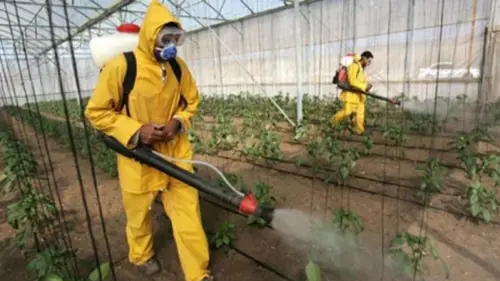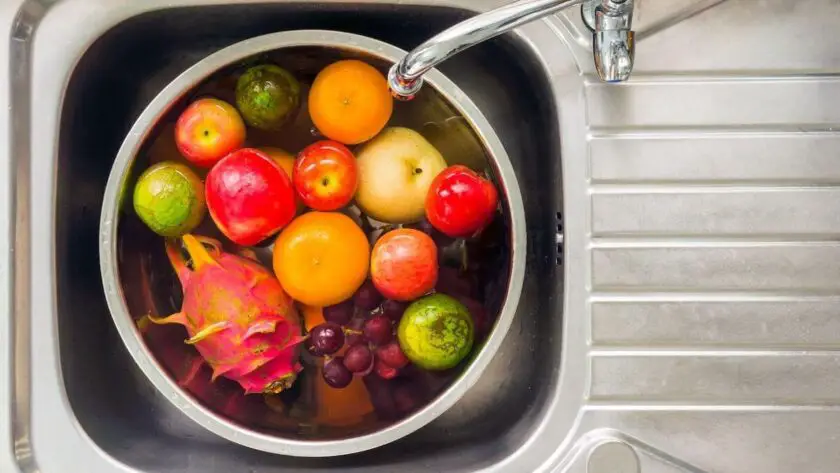The pervasive use of pesticides and herbicides in conventional farming practices (and even some organic farms) can have alarming consequences for our well-being. Modern agriculture heavily relies on these chemical substances to protect crops from pests and boost yields without having to switch crops or utilize agricultural practices like using farm animals and livestock to replenish soil.
Unfortunately, the overuse and misuse of these chemicals have become a pressing concern, as studies increasingly link them to adverse health effects, including disruptions to the delicate balance of our gut microbiome.
The gut microbiome, a diverse community of trillions of microorganisms residing in our intestines, plays a crucial role in maintaining our overall health. It helps with digestion, supports immune function, synthesizes vitamins, and even influences our mental well-being. However, the harsh chemicals used in conventional agriculture can wreak havoc on these delicate microbial ecosystems.
Every year, the unveiling of the Environmental Working Group’s ‘Clean Fifteen’ and ‘Dirty Dozen’ lists provides valuable guidance for health-conscious shoppers seeking the cleanest possible produce. The latest release continued the usual trend, except for a couple of common crops showing “less than one percent detectable pesticides,” even in non-organic forms.
Yet, the pesticide conundrum remains unsolved in the United States, especially with Bayer’s imminent acquisition of Monsanto. Despite increasing levels of glyphosate and other harmful chemicals in our environment, the silver lining is the resurgence of organic food and a multitude of strategies to limit your exposure to detrimental pesticides.
The Dangers Of Pesticides And Herbicides
Pesticides and herbicides are powerful chemicals designed to protect crops by eradicating pests and controlling weed growth. While they serve their intended purpose in conventional farming, the unintended consequences of these chemicals can be severe, both for human health and the environment.
- Health Risks of Ingesting Pesticides and Herbicides:
Numerous studies have linked pesticide and herbicide exposure to a range of health issues. The residues left on produce can find their way into our bodies through ingestion, and even in small amounts, they can have detrimental effects on our health. Some of the potential health risks associated with pesticide exposure include:
-
- Neurological Effects: Certain pesticides, such as organophosphates and neonicotinoids, have been linked to neurological disorders, including memory problems, developmental delays in children, and even an increased risk of Parkinson’s disease.
- Endocrine Disruption: Many pesticides act as endocrine disruptors, interfering with hormone production and regulation. This disruption can lead to reproductive problems, developmental issues in children, and hormonal imbalances.
- Carcinogenic Potential: Some pesticides, like glyphosate (a widely used herbicide), have been classified as probable human carcinogens by reputable organizations such as the World Health Organization’s International Agency for Research on Cancer (IARC).
- Immune System Suppression: Pesticide exposure may weaken the immune system’s response, leaving individuals more susceptible to infections and diseases.
- Allergic Reactions: Pesticides can trigger allergic reactions, causing skin irritation, respiratory problems, and other allergy-related symptoms.
- Environmental Impact of Pesticides and Herbicides:
 The effects of pesticides and herbicides extend far beyond the confines of the fields they are sprayed on. These chemicals are often referred to as “forever chemicals” because they are resistant to breaking down naturally and persist in the environment for long periods. As a result:
The effects of pesticides and herbicides extend far beyond the confines of the fields they are sprayed on. These chemicals are often referred to as “forever chemicals” because they are resistant to breaking down naturally and persist in the environment for long periods. As a result:
- Soil Contamination: Pesticides can accumulate in the soil, disrupting soil microbial activity and potentially causing long-term damage to soil health and fertility.
- Water Pollution: Pesticides are water-soluble, meaning they can easily leach into groundwater and surface water bodies, contaminating drinking water sources and aquatic environments. This runoff poses a significant threat to aquatic life and ecosystems.
- Harm to Non-Target Organisms: Pesticides do not discriminate between pests and beneficial insects. Bees, butterflies, birds, and other pollinators can fall victim to these chemicals, leading to disruptions in ecosystems and biodiversity.
- Resistance in Pests: Over time, pests can develop resistance to certain pesticides, leading to the use of even stronger chemicals to combat them. This cycle of escalating chemical use further exacerbates the environmental impact.
- Impact on Food Chains: Pesticides can affect the entire food chain, with predators ingesting contaminated prey and facing the same health risks as the original target pests.
Finding a Solution: Baking Soda
Baking soda, a simple yet powerful cleaning agent, has been proven to break down pesticides and herbicides effectively. Its remarkable ability lies in its chemical properties, primarily its alkaline nature.
When mixed with water, baking soda forms a solution that raises the pH level, creating an environment that accelerates the degradation of these harmful chemicals. This process facilitates the breakdown of pesticide residues on the surface of produce, making baking soda an excellent choice for removing up to 99% of these toxins.
As a natural, safe, and inexpensive solution, baking soda offers a practical and eco-friendly alternative for health-conscious consumers looking to safeguard their well-being and reduce exposure to harmful agricultural chemicals.
Recipe For Produce Cleaner:
For effective removal of harmful toxins from your produce, a simple mixture of 1 tablespoon baking soda and 1.5 liters of water is all you need. This method outperforms both pure water and bleach solution.
To fully harness the benefits, the study advises soaking your Gala apples in the baking soda solution for at least eight minutes. This duration yielded “significantly reduced pesticide residue on the surface,” according to the researchers.
A more extended soak of 12-15 minutes leads to “virtually no pesticides left,” mirroring the results for avocados and sweet corn.
While opting for organic produce is still preferred for its soil-friendly farming practices and higher antioxidant and mineral content, remember to grab some baking soda when shopping for conventional produce.
Selecting the Best Baking Soda Brand
Mainstream baking soda brands can suffice for household uses and quick fixes, but it is advisable to choose a naturally mined brand over chemically extracted ones.
Click Here To Check Out Star West Botanicals Baking Soda

Due to its traditional mining method, which eliminates the need for chemical processes that are common with other brands.
If baking soda isn’t your preferred choice, you might want to try a blend of lemon juice and white vinegar. It’s crucial to select organic vinegar when possible, as popular brands like Heinz often derive their products from genetically modified corn, which may have been doused with Roundup herbicides.
Additional Tips for Cleaning Produce
When washing produce with tough skins such as potatoes or cucumbers, use a vegetable brush to scrub the surface thoroughly.
Leafy greens can be difficult to clean due to their many crevices. Submerging them in a bowl of cold water and swishing them around can help remove dirt and potential pesticide residues.
Produce with soft skins, like tomatoes and grapes, should be rinsed under running water to avoid damage.
Make sure to dry your produce thoroughly with a clean cloth or paper towel to further remove any remaining pesticides.
Don’t forget to wash produce that has a peel you don’t eat, such as bananas or oranges. The act of peeling can transfer pesticide residues to the edible part.
Given the widespread use of pesticides and herbicides and their long-lasting environmental impact, it is essential for consumers to be proactive in safeguarding their health and well-being.
In conclusion, the presence of pesticides and herbicides in grocery store produce is a concerning reality that demands attention. The potential health risks associated with ingesting these chemicals, coupled with their lasting environmental impact, underscore the need for more sustainable agricultural practices and consumer awareness.
By opting for organic produce whenever possible and employing effective methods to remove harmful residues, we can take significant steps toward a healthier future for both ourselves and the planet. Embrace the power of knowledge and natural solutions to protect your gut health and contribute to a more environmentally conscious way of living. Together, let’s stand for safer food and a cleaner world.





